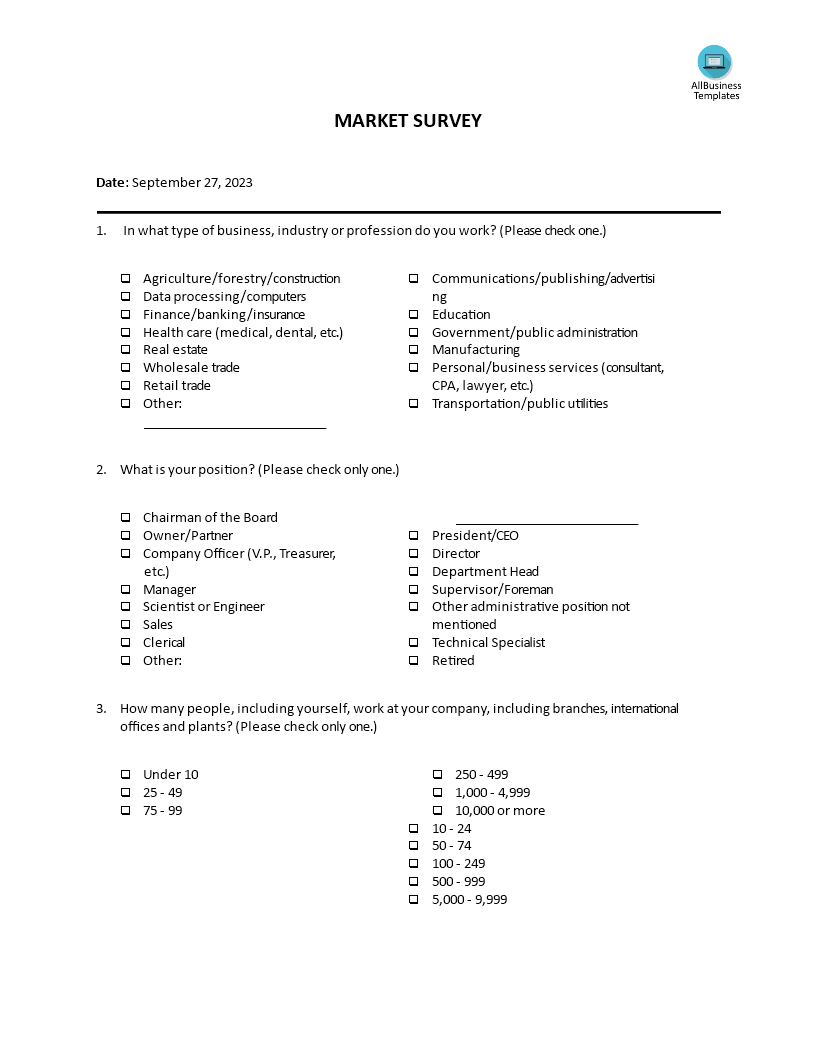Market Survey
Save, fill-In The Blanks, Print, Done!

Download Market Survey
Today: USD 1.99
Download It Now

Available premium file formats:
Microsoft Word (.docx)- This Document Has Been Certified by a Professional
- 100% customizable
- This is a digital download (51.22 kB)
- Language: English
- You will receive a link to download the file as soon as your payment goes through.
- We recommend downloading this file onto your computer.
What are the steps for creating a market survey form? Do you need a template to Survey a market? Download our sample template now and get started. With our template, you can easily create a survey in minutes. The survey template is fully customizable and can be tailored to the specific needs of your business.
A "Market Survey" refers to the systematic process of gathering, analyzing, and interpreting information about a specific market or industry. The primary purpose of a market survey is to gain insights into market conditions, consumer preferences, industry trends, and competitive factors. This information is valuable for businesses, organizations, entrepreneurs, and investors to make informed decisions and develop effective marketing and business strategies.
Key aspects of a market survey include:
- Data Collection: Market surveys involve collecting data from various sources, such as surveys, questionnaires, interviews, observations, and existing research reports. The data can be both quantitative (e.g., numerical data) and qualitative (e.g., opinions and insights).
- Target Audience: Market surveys are typically designed to target a specific audience or group of individuals who represent the market of interest. This audience can include current or potential customers, industry experts, competitors, or other stakeholders.
- Research Objectives: Before conducting a market survey, clear research objectives are defined. These objectives help determine what specific information is needed, such as understanding customer preferences, assessing market demand, or evaluating the competitive landscape.
- Methodology: Market surveys can be conducted using various research methodologies, including online surveys, telephone interviews, face-to-face interviews, focus groups, and more. The choice of methodology depends on the research objectives and the characteristics of the target audience.
- Questionnaire Design: If surveys are used, a well-structured questionnaire is created to collect relevant data. The questions should be clear, unbiased, and designed to gather actionable information.
- Sampling: In many cases, it's not feasible to survey an entire market, so a representative sample of the target audience is selected. Sampling methods ensure that the sample accurately reflects the larger population.
- Data Analysis: Once data is collected, it is analyzed to identify trends, patterns, and insights. Quantitative data may be analyzed using statistical techniques, while qualitative data may be analyzed thematically.
- Report and Findings: The results of the market survey are typically compiled into a report. This report summarizes the key findings, provides recommendations, and may include charts, graphs, or other visuals to illustrate the data.
- Decision-Making: The insights gained from the market survey inform decision-making processes. Businesses and organizations can use this information to refine their product offerings, marketing strategies, pricing, and distribution channels.
- Competitive Analysis: Market surveys often include a competitive analysis to understand how a company's products or services compare to those of competitors in terms of quality, pricing, and customer satisfaction.
- Market Segmentation: Market surveys may identify different market segments or customer personas based on factors such as demographics, behavior, and preferences. This helps in targeting specific customer groups effectively.
- Market Trends: Market surveys can provide information about emerging trends and shifts in consumer behavior, enabling businesses to adapt to changing market conditions.
Overall, market surveys are valuable tools for gathering information and staying informed about market dynamics. They help organizations make data-driven decisions, minimize risks, and capitalize on opportunities in their respective markets.
Download this professional Market Survey template now!
DISCLAIMER
Nothing on this site shall be considered legal advice and no attorney-client relationship is established.
Leave a Reply. If you have any questions or remarks, feel free to post them below.
Related templates
Latest templates
Latest topics
- GDPR Compliance Templates
What do you need to become GDPR compliant? Are you looking for useful GDPR document templates to make you compliant? All these compliance documents will be available to download instantly... - Google Docs Templates
How to create documents in Google Docs? We provide Google Docs compatible template and these are the reasons why it's useful to work with Google Docs... - IT Security Standards Kit
What are IT Security Standards? Check out our collection of this newly updated IT Security Kit Standard templates, including policies, controls, processes, checklists, procedures and other documents. - Letter Format
How to format a letter? Here is a brief overview of common letter formats and templates in USA and UK and get inspirited immediately! - Google Sheets Templates
How to work with Google Sheets templates? Where to download useful Google Sheets templates? Check out our samples here.
cheese
